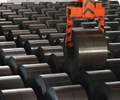

With the summer slow period on its way out, the European market is looking onwards to a possible settlement of the Section 232 steel tariff dispute on November 1, which could restore the flexibility of vital trade routes between Europe and the US, compliant with WTO regulations.
Should the tariff on European steel exports be abolished, domestic buyers fear another surge in local steel prices at a time when hot-rolled coil prices are still above Eur1100/mt ex-works Ruhr, and European domestic stock levels remain exceptionally tight.
The US and EU had previously agreed to work together in resolving a metals trade dispute, following from the former’s Section 232 steel and aluminum tariffs against European exporters by the end of the year, according to a joint statement released following the US-EU Summit June 15.
Reaching a settlement could prove difficult, however, with steel tariffs an integral component of the US steel industry, particularly in heavy-producing states like Ohio, Pennsylvania and Indiana.
There is currently no US steel quota system in place, while steel safeguard measures are firmly entrenched in the domestic European market. From July 1, the European steel safeguards were extended by a further three years and included only a marginal 3% increase to existing quota allowances.
EU steel market reacts, concerns build over tariff decision
Reactions to the potential removal of the Section 232 tariffs have been mixed from sources, with sell-side participants keen to capitalize on the arbitrage to the US, whereas higher domestic prices could spell financial trouble for buyers already struggling to extend credit limits.
“The elimination of 25% import tax for EU material into the US might lead to higher export from Europe and price increase here. All those with access to good logistics would benefit,” a German distributor said.
In the Benelux, a service center source said the Section 232 tariffs posed a “real threat” to Europe, but said higher domestic prices were necessary to finance green steel making.
“I think it’s the ambition of the EU to keep prices high in order to finance the transition to CO2-neutral steel melting; otherwise, the EU and individual states will have to subsidize enormous amounts to keep the steel industry in house,” the source said. The source added that China was watching the situation very closely.
If the tariff were to be scrapped, a Benelux buyer also agreed to the possibility of inflated European prices, but said it was unlikely the Biden administration would be easily swayed.
“I have the feeling [President] Biden has the same policy as Trump – America comes first – only he says it in a friendlier way!” the buyer said.
Former President Trump initiated a 25% steel tariff and 10% aluminum tariff on metal imports from most countries under Section 232 in March 2018. The tariff was imposed following Commerce’s investigation which found that surging steel and aluminum imports posed a national security threat.
Mills were mostly optimistic about the tariff discussions, having chosen to withhold raising their prices in anticipation of a possible Section 232 removal. Regardless, European producers are not in a rush to initiate another pricing surge, with current market dynamics working in their favor, a Benelux distributor source said.
“Mills are maintaining prices. They have good orderbooks, the month of September is sold. So, unless something significant like a decision on Section 232 happens, I don’t expect any change,” he said.
S&P Global Platts assessed North European HRC prices stable at Eur1,145/mt ex-works Ruhr August 19, and in Southern Europe, prices were steady at Eur1,045/mt ex-works Italy.
Since the start of the year, HRC Ruhr prices have climbed Eur480/mt, and in Italy, HRC prices have increased by nearly Eur390/mt.
A Turkish service center manager told Platts he didn’t expect the removal of Section 232 to have a serious upward effect on prices, as bearish sentiment has begun to dominate the global steel market sentiment in recent weeks, amid falling raw material prices.
“The effect of the Section 232 removal on prices could be short-lived amid the easing of the availability issues in the global market. Supply options widened. Indian producers are already in the market and Vietnamese producers are ready to enter both the EU and US with competitive prices. These suppliers could change the game plan,” he said.
US market perspective on Section 232 mixed
US market sources were also discussing outcomes from a potential resolution of the dispute.
“I am not convinced that there will be an immediate impact if EU is excluded from Section 232,” a US based trader said. “Everyone is talking about Nov. 1 for the date of a potential solution, but I believe there would be a 60- to 90-day transition period.”
The trader added that such decision would pull European prices higher but did not see it as a “game changer” for US pricing due to limited European idled capacity that could be brought back online in the short run.
Some buy-side sources, however, doubted the impact would be limited as they started seeing more European volumes getting booked in the US. Early August, buy-side sources started reporting HRC transactions at around $1,600/st and CRC transactions at around $1,800/st from at least two separate European mills. Prices were on Great Lakes DDP port basis with November arrival times.
Those import deals were still at a significant discount to US sheet prices. Platts US HRC index was at $1,901.75/st and CRC index at $2109.50/st on Aug. 18, both on ex-works Indiana basis.
Source: Platts